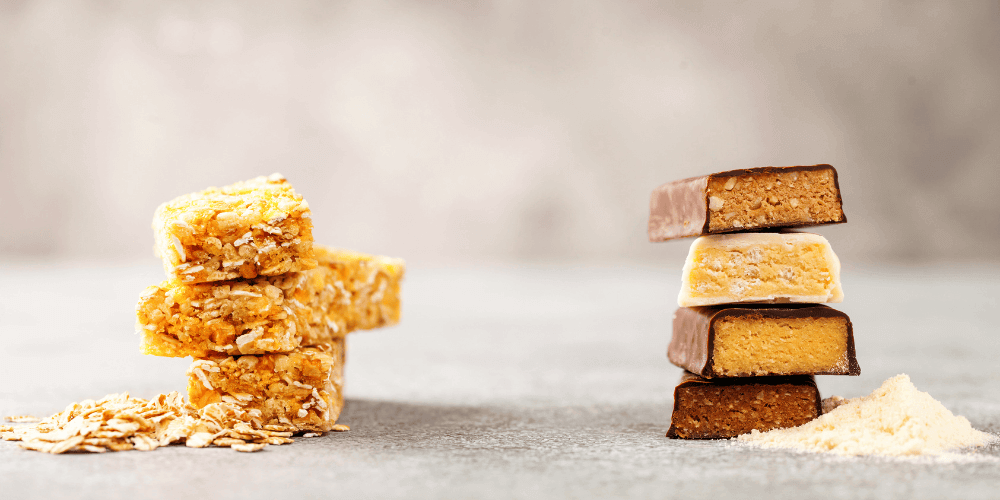In today’s health-conscious world, the demand for natural, nutritious, and sustainable food products is on the rise. One product leading the charge is protein bars made from plant-based powders.
When we talk about protein bars, we’re referring to nutrition bars that are high in protein and often used as a meal replacement or a snack by health enthusiasts, athletes, and individuals on the go. Traditionally, these bars have been made using various sources of protein, including whey, casein, or soy. However, in recent years, there has been a significant shift towards plant-based sources of protein, leading to the rise of plant-based powders. These powders are derived from various plants like peas, rice, hemp, and more. They are naturally rich in protein, fibers, vitamins, and minerals, making them a fantastic, wholesome alternative to traditional protein sources.

Protein bars have become a staple in the diet of many due to their convenience and nutritional value. They are easy to consume, and provide a quick source of protein, which is essential for muscle building, recovery, and overall health. Plant-based powders, on the other hand, not only supplement these bars with high-quality protein but also bring additional benefits to the table. Incorporating plant-based powders into protein bars can boost their nutritional profile and appeal to a broader audience, including vegans, vegetarians, and environmentally-conscious consumers. Stay tuned as we delve further into the world of plant-based powders and their incorporation into protein bars in the following sections.
Plant-based powders, often referred to as ‘superfoods’, are derived from natural sources such as fruits, vegetables, grains, seeds, and other plants. They are carefully processed to retain their nutritional value and then ground into a fine powder. Here at POW(D)ER by Nexira, we view them as powerful nutritional toolboxes, each carrying unique vitamins, minerals, and health benefits that can be perfect for fortification or nutrition-rich product formulation.
There is a myriad of plant-based powders each with its own unique health benefits. For instance, hemp, is a notable plant-based powder for its high protein and fiber content. Sourced from Peru, Quinoa See Powder is a nutritious alternative grain known for its interesting protein content. There is also quinoa powder which is the perfect protein source for vegan, vegetarian, and gluten-free recipes to increase the protein content and nutritional value of the food product. Astragalus powder is also rich in protein and also has a high-fiber content. The powder is believed to help stimulate the immune system and may help to enhance the body’s response to stress.
Each ingredient offers special nutrients and advantages that contribute toward overall health and wellness.
Incorporating plant-based powders into protein bars can result in several health benefits. Some of them are rich in fiber, thus promoting good digestive health, and various vitamins and minerals essential for overall wellbeing.
Transitioning to plant-based ingredients like protein powders also has a positive environmental impact. The production of plant-based proteins often requires significantly less water and land compared to animal-based proteins, making them a more sustainable choice. The shift towards plant-based diets is driven not only by health but also environmental concerns. An Oxford University study found that producing plant-based foods is vastly more eco-friendly than producing animal-based foods.
Getting the correct proportion of plant-based powders in your protein bars is essential for keeping nutritional values intact while ensuring palatable taste and texture. Generally, too high a proportion might result in a gritty texture, whereas a low ration could compromise on protein content. At Nexira, we recommend working with a food scientist or nutritionist to strike the right balance.
Not all plant-based powders taste the same, and some flavors may not work well together. Therefore, understanding how the flavors of your chosen plant-based powders interact with other ingredients in your recipe is crucial. By getting the flavor compatibility right, you can create protein bars that are both nutritious and delicious!
Texture plays a significant role in how we enjoy our food. Plant-based powders can alter the texture of protein bars, so considerations must be made to ensure the end product is appealing. Again, testing various proportions and using mix-ins like nuts or dried fruit can help improve the texture.
Creating the perfect protein bar requires binding ingredients to hold everything together. Natural binders such as acacia gum work well with plant-based powders. Beyond binding, acacia adds nutritional value and contribute to the overall flavor profile.
While protein is the star of the show, a touch of sweetness can enhance the taste of your bars. Thankfully, natural sweeteners like maple syrup, agave nectar, or stevia can provide this without the health pitfalls of processed sugars. They perfectly complement the natural taste of plant-based powders.
Market research indicates that consumers are increasingly opting for natural, nutrient-dense and plant-based options. In fact, a report from Meticulous Research projects 7.6% growth in the plant-based protein market from 2020 to 2027. This trend is especially prominent among millennials for whom health and wellness are a top priority.
From celebrities sharing their plant-based journeys to start-ups creating cutting-edge, plant-based protein bars, the influence and demand for health-centric, plant-based foods are undeniable. A great example is “Vega” which started as a simple question: “Can a plant-based performance product deliver the results you need?” Today, Vega is recognized as an industry leader in plant-based protein products.
The future of plant-based protein bars is vibrant with possibility and teeming with innovation. As suppliers and manufacturers continue to explore new superfood ingredients, flavors and textures, they are also catering to a wider variety of health needs and taste preferences.
The rise of personalized nutrition, tailored to the individual’s unique health needs and goals, may lend additional momentum to the plant-based protein bar market. Advancements in food technology are allowing manufacturers to create protein bars with targeted health benefits, such as boosting immunity, improving gut health or aiding in muscle recovery.

oin Nexira on this sensory journey encompassing taste, texture, and color – and start creating nutrition that is evolutive with market trends, harnessing the powerful forces of nature in recognizable superfoods – in a whole new way!
This communication is not intended to the final consumer. It provides scientific information for professionals only. Communications to the final consumer have to be checked according to local regulations in force, since the conditions of use are beyond our control. This statement has not been evaluated by the FDA. This product is not intended to diagnose, treat, cure, or prevent any disease